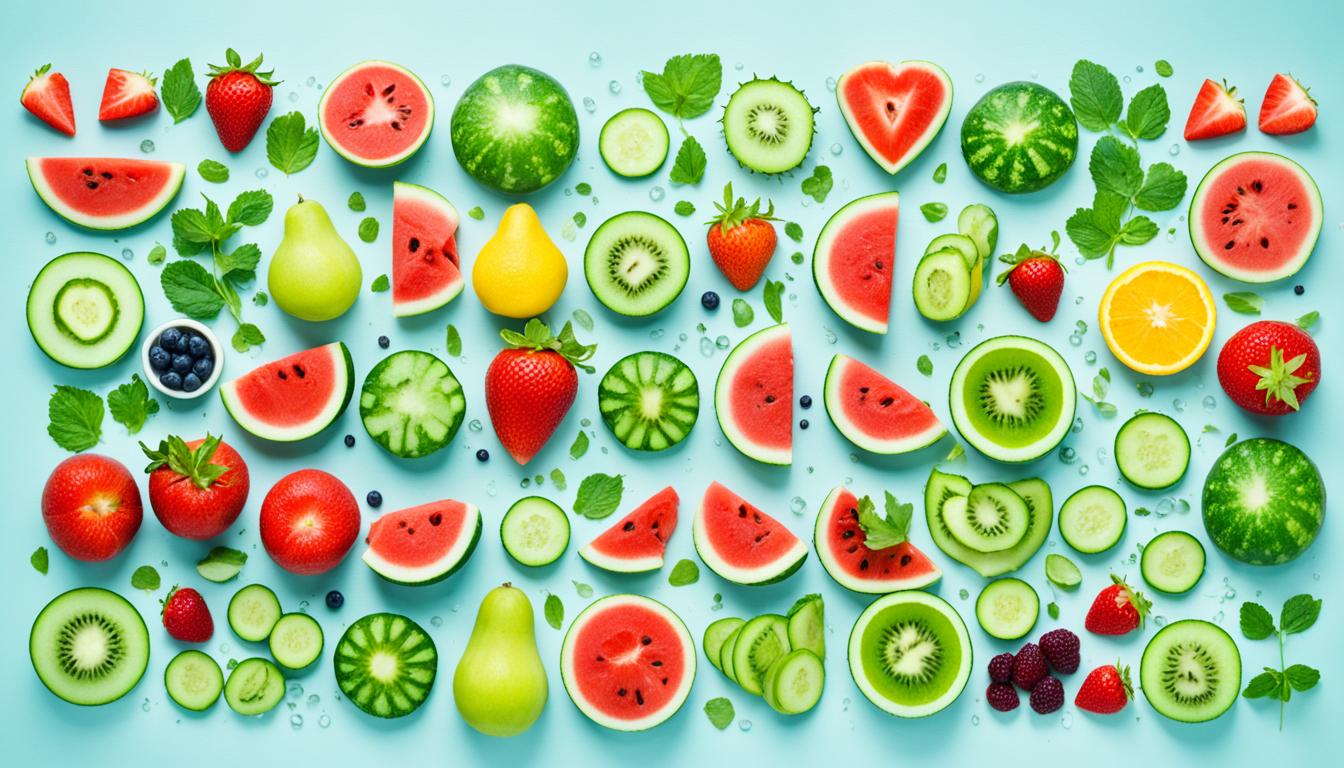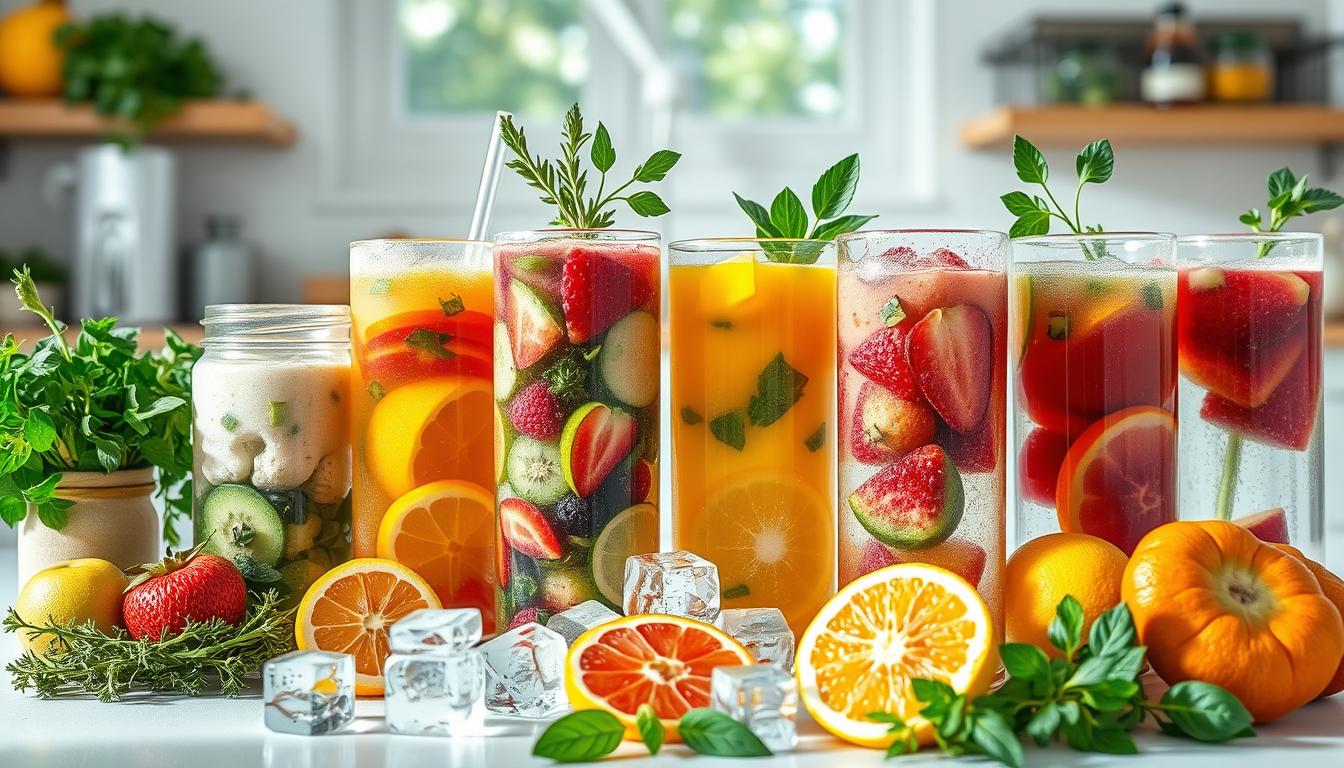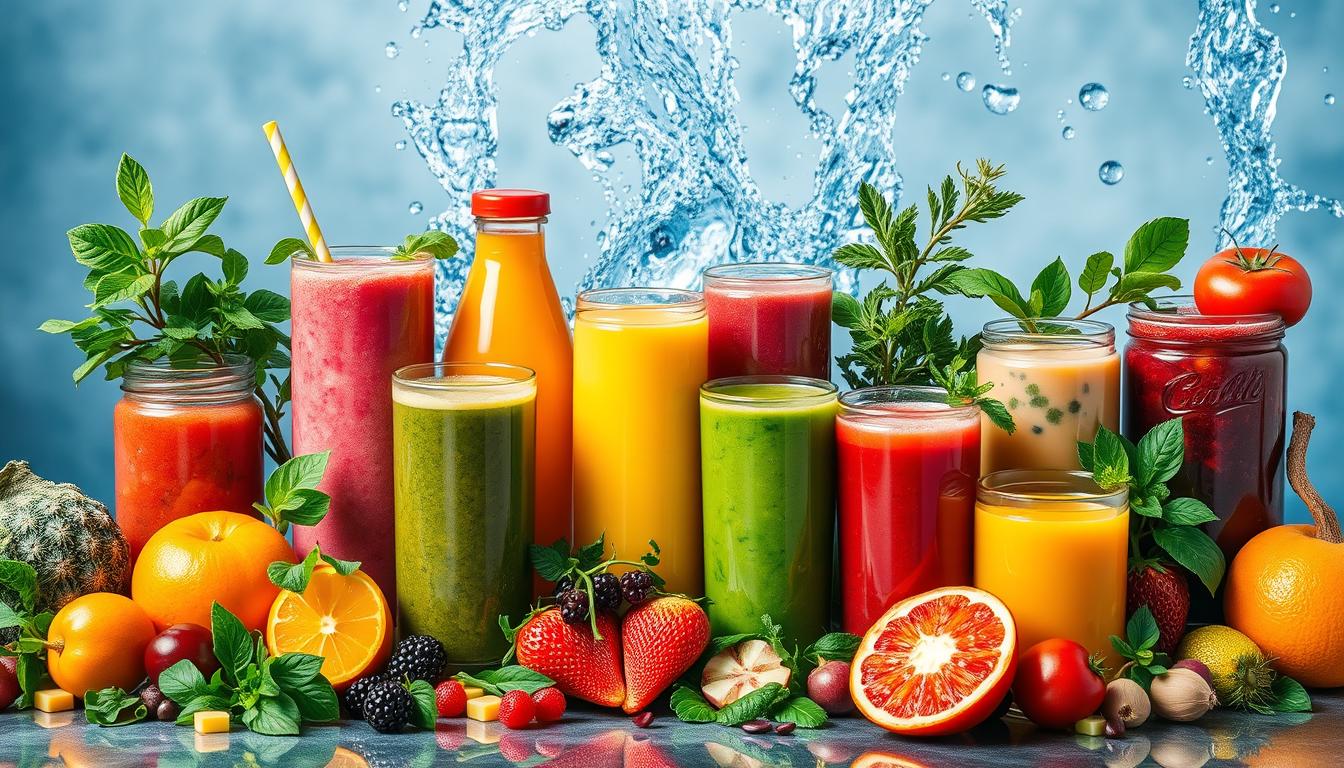There are lots of incorrect ideas about staying hydrated. Knowing the truth is important for our health. Experts like Tamara Hew-Butler, Mindy Millard-Stafford, and Yuki Oka are working hard to clear up these myths. They show us what’s really important for staying hydrated.
Water is crucial for our bodies. It helps get rid of waste, controls our temperature, and keeps our cells healthy. Our body has a smart way to tell us when it needs more water. This includes feeling thirsty and managing how much water and salt we take in. Also, we get a big part of our fluids, almost 20%, from the food we eat. This includes things like fruits, veggies, and pasta1.
Lots of people think you have to drink eight glasses of water every day. But, in 2002, experts didn’t find strong proof for this1. The right amount of water to drink depends on you. Your body size, how much you move, and the weather all play a part. For example, the Institute of Medicine says women should aim for 91 ounces a day. Men should get about 120 ounces2.
Pay attention when your body says it’s thirsty. It’s one of the best ways to know if you need more water. Being properly hydrated is key to being healthy. By learning the true facts and not the myths, you can make better choices about how much water to drink each day.
Debunking the 8 Glasses of Water a Day Myth
Many believe drinking eight 8-ounce glasses of water daily is necessary. Yet, there’s not much strong proof behind this idea. This has led to a lot of people being confused about how much water they really need.
The Origin of the 8 Glasses Myth
The idea of needing 2.5 liters of water each day came from a 1945 recommendation in the US3. But, this amount isn’t perfect for everyone. Our individual needs vary.
Research Findings on Optimal Water Intake
A 2002 study found little evidence to support drinking eight glasses a day1. The U.S. National Academies suggests 92-124 ounces is better, adjusted for personal factors4. Recent studies haven’t shown more water is better for kidney health either3. They suggest a tailored approach to water intake is best.
Listening to Your Body’s Thirst Signals
It’s better to listen to your body’s cues than to follow fixed rules. Thirst is a sign of dehydration, but it’s not always reliable4. The body does a good job of balancing the water we need. Watching your urine color can better show if you’re drinking enough water1. This can clear up the confusion around how much water is right for each person.
Does Caffeine Really Dehydrate You?
Many people talk about how caffeine dehydrates you. But, studies from 1928 to today offer insights. Caffeine can make you pee more, but since coffee is mostly water, it evens out. This happens when you drink normal amounts4.
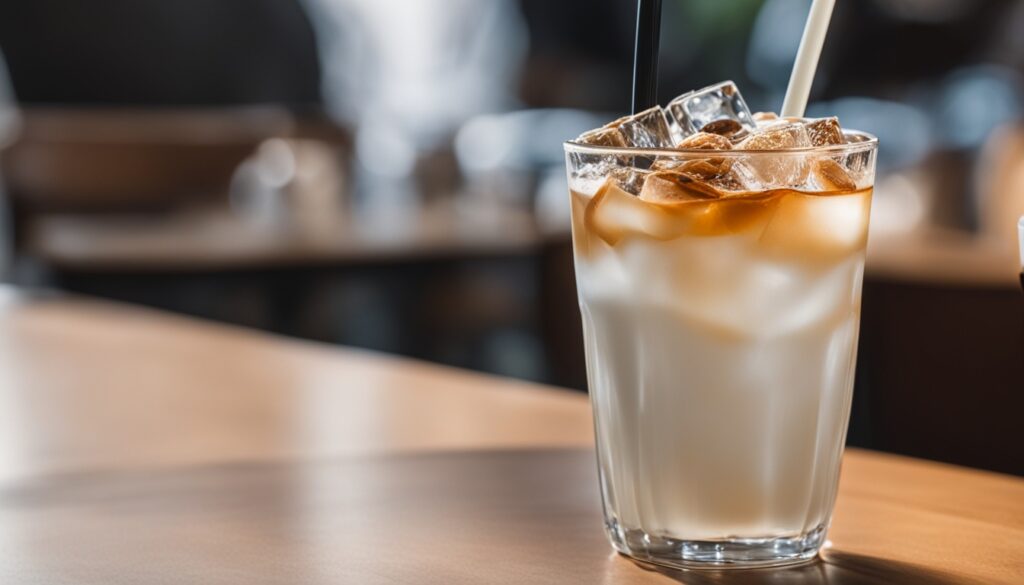
Caffeine’s Diuretic Effect Explained
Caffeine can act as a diuretic, making some worry about getting dehydrated. Yet, those who drink coffee in moderation don’t see big changes in water content or hydration markers. This was found in studies where people drank either coffee or water5. It’s important to note that our body’s water balance is quite complex. And it’s not just coffee that matters for staying well hydrated.
Comparing Caffeinated and Non-Caffeinated Drinks
When we look closely at caffeinated versus non-caffeinated drinks, we find some surprises. A study found that even though people who drank coffee peed more sodium, their overall fluid balance didn’t really change5. Other research and a meta-analysis suggest that drinks with caffeine, when consumed in moderation, can hydrate you just like water6. The U.S. National Academies recommend drinking between 92-124 ounces of water daily in mild climates4. This means you can count coffee toward your daily fluid goals.
It’s also vital to understand how drinks and food play a part in keeping you hydrated. Remember to drink water and other liquids, as waiting until you’re thirsty might be too late4. So, as you enjoy your coffee, know that it’s not a hydration villain. Rather, it can be a part of your daily hydration plan.
Hydration Myths Debunked: What You Really Need to Know
Understanding the importance of hydration is key, but myths can confuse us. Many think we need eight cups of water each day. However, a study in 2002 found no strong proof for this advice1. So, trusting our own body signals is crucial.
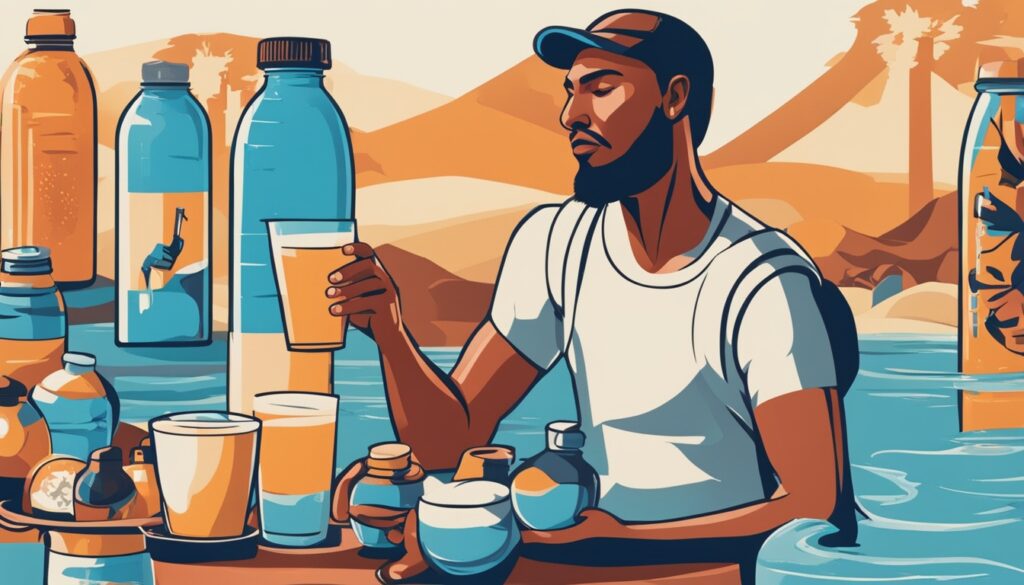
Thirst is how our body tells us to drink. It might surprise you that 20% of fluids we need are in our foods, like fruits and pasta1. Eating well is as important as drinking fluids for our hydration.
Did you know, caffeine doesn’t dry you out? Studies show caffeinated drinks hydrate the same as water1. This means your cup of coffee or tea can help, not harm, your hydration goals.
For athletes, listening to their bodies helps keep their salt levels right during long sports events1. This shows that our natural instincts are pretty good at keeping us properly hydrated. It argues against using too many guidelines or supplements.
Concerning weight, drinking water before meals might not help much. Instead, switching sugary drinks for water seems more beneficial for losing weight1. It’s what you drink that matters more than how much.
Using urine color to check your hydration is not always reliable. Athletes might look dehydrated by urine tests, but their blood doesn’t show that1. This means we need to find better ways to know if we’re truly hydrated.
Learn more about busting hydration myths by visiting Busting Common Hydration Myths.
The Truth About Sports Drinks and Replacing Electrolytes
Sports drinks are often seen as key for refilling electrolytes. Knowing when to use them, though, is vital for good health.
When are Sports Drinks Necessary?
Sports drinks are good when you’ve been working out a lot or it’s hot and sticky4. In these times, your body might run low on sodium and potassium. This is when sports drinks really help. They can keep you in your best shape for sports or long activities4.
Natural Alternatives for Electrolyte Replacement
But, there are also natural ways to get electrolytes back. Things like bananas, dairy, and green veggies are great choices. Eating a bit of something salty after exercise can also help, especially if you sweat a lot of salt4. These natural foods fit well into your daily meals.
Trusting Your Body’s Thirst for Salt
Listening to your body’s thirst can lead to better hydration. Thirst is the first sign you need some water4. It’s not good to wait until you’re really thirsty, though. In those cases, your body might need salt. Craving salty snacks after a workout could mean your body wants more electrolytes4.
To learn more about hydration myths and the facts, check out University of Rochester Medical Center.
FAQ
What are the essential facts about hydration?
Where did the myth of needing to drink eight 8-ounce glasses of water a day originate?
What do recent research findings say about optimal water intake?
How should I listen to my body’s thirst signals?
Does caffeine really dehydrate you?
How do caffeinated drinks compare to non-caffeinated drinks in terms of hydration?
What role do sports drinks play in hydration?
Are there natural alternatives for replacing electrolytes?
How can I trust my body’s thirst for salt?
Source Links
- https://www.npr.org/2022/09/21/1124371309/busting-common-hydration-water-myths
- https://www.runnersworld.com/nutrition-weight-loss/a20831302/8-hydration-myths-busted/
- https://www.mcgill.ca/oss/article/health-nutrition/water-myth
- https://www.urmc.rochester.edu/news/publications/health-matters/hydration-101-drinking-8-glasses-of-water-and-other-myths-debunked
- https://www.ncbi.nlm.nih.gov/pmc/articles/PMC3886980/
- https://www.mayoclinic.org/healthy-lifestyle/nutrition-and-healthy-eating/expert-answers/caffeinated-drinks/faq-20057965

